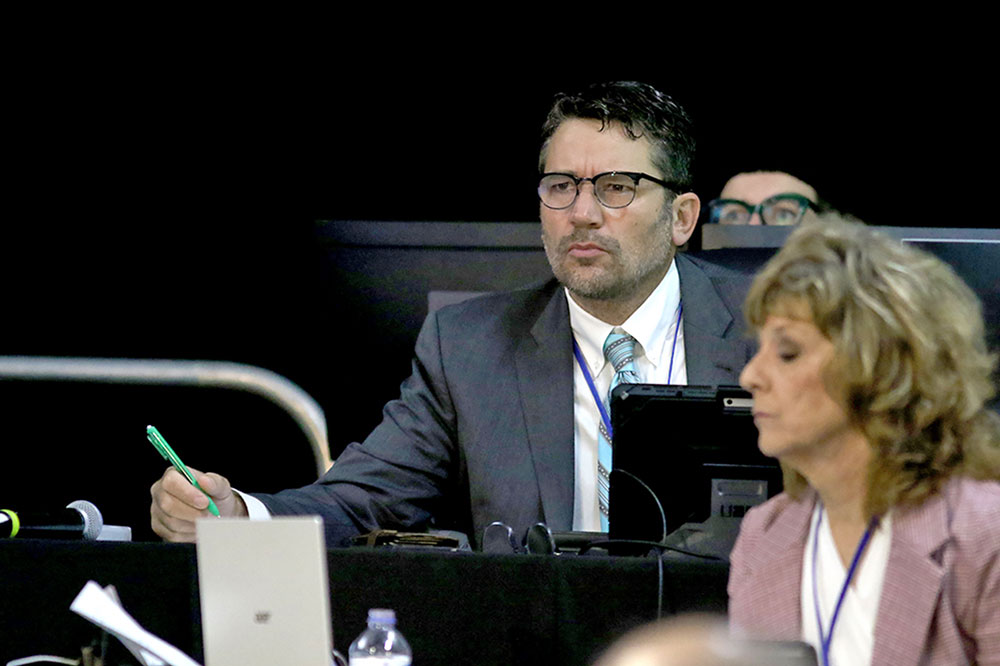South Dakota Legislature passes attempted balance between landowners and carbon pipeline project
By Joshua Haiar, Iowa Capital Dispatch
Years of debate about a proposed carbon dioxide pipeline came to a head Wednesday at the South Dakota state Capitol as lawmakers passed three bills intended to strengthen landowner protections while maintaining a regulatory path forward for the project.
The bills passed the state House of Representatives and Senate and now head to the governor’s desk for final consideration.
Gov. Kristi Noem issued a statement saying she plans to sign the bills to “provide new protections for landowners and allow for economic growth to move forward through a transparent process.”
Rep. Jon Hansen, R-Dell Rapids, who voted against all three bills, said lawmakers should do more to protect landowners. He pointed to Democratic-dominated Minnesota, where he said carbon sequestration pipelines can’t use eminent domain to access land.
Eminent domain is a legal power the pipeline company could use to cross land if landowners don’t grant voluntary easements. Legislative efforts to block the use of eminent domain failed each of the last two sessions.
“We should be ashamed by that,” Hansen said.
He alleged the bills’ proponents are “paving the golden road” for the project.
House Majority Leader Will Mortenson, R-Fort Pierre, was the prime sponsor of the bills with Senate Majority Leader Casey Crabtree, R-Madison. Mortenson said lawmakers opposing the legislation were offering a “do nothing solution.”
“They’d rather give speeches and go get likes on Facebook than roll up your sleeves, get everyone around the table and put the policies in place that help our farmers,” Mortenson said.
The bills are related to an $8 billion pipeline proposed by Summit Carbon Solutions, which is headquartered in Iowa. It would collect carbon dioxide from 57 ethanol plants in South Dakota and neighboring states and pipe it to North Dakota for underground storage.
The project would take advantage of up to $18 billion in federal tax credits that incentivize the removal of heat-trapping carbon dioxide from the atmosphere. Some ethanol backers have said the project is needed to reduce carbon emissions from ethanol production and keep the corn-based fuel viable in a future where governments and consumers are demanding lower climate impacts.
Summit plans to apply again for a permit in South Dakota after its initial application was denied by the Public Utilities Commission, in part due to conflicts with county ordinances that require minimum distances known as “setbacks” between pipelines and other features. The commission of three elected officials is responsible for pipeline permitting in the state.
The project has faced opposition from landowners concerned about property rights and safety, including health risks associated with potential leaks.
The three bills that passed Wednesday address issues including surveying, easement agreements, and compensation for landowners.
What the bills say
What the bills’ backers have dubbed a “Landowner Bill of Rights” was recently added to the bottom of one of the bills. It lays out the new landowner benefits and protections offered by the three pieces of legislation.
Carbon capture pipeline operators will have to pay $500 for access to survey land. Counties through which the pipelines run could collect a surcharge of up to $1 per linear foot, with at least half of the surcharge allocated for property tax relief for affected landowners. The remaining funds could be used at the county’s discretion.
The bills ensure the pipeline companies, rather than landowners, are liable for damages caused by the projects. Companies also must submit an impact mitigation plan and bury pipelines at least 4 feet deep. One of the bills mandates public disclosure of modeling to gauge the impact of a pipeline rupture.
The bills restrict easement durations, terminating them if a pipeline does not secure a Public Utilities Commission permit within five years or if the easement goes unused for the same period. Additionally, easements cannot extend beyond 99 years and must be documented in writing and recorded in a county register of deeds office.
Landowners are entitled to land survey notices and results, examination findings, and contact information for the inspection supervisor. Landowners are given the right to contest and try to stop surveys by going to court within 30 days of receiving written notice of the planned survey.
In response to controversy about out-of-state contractors working for the pipeline company, one of the bills says a land agent acting on behalf of a carbon pipeline project must be a pipeline facility employee, a resident of the state, or a real estate agent licensed in the state.
Current law says the Public Utilities Commission may overrule counties’ pipeline setbacks (although the commission has so far declined to do so). Earlier versions of one bill would have altered that power, first giving setback authority solely to the state, and then in a later version leaving it with counties but saying the commission would have to overrule any overly burdensome setbacks.
The final, approved version of the legislation says the commission’s permitting process overrules local setbacks and other local rules regarding pipelines, unless the commission requires compliance with any of those local regulations.
Reaction
Sen. Al Novstrup, R-Aberdeen, said the Summit project alone will not lower the planet’s temperature one degree; therefore, “the reason for CO2 capture fails.” He said diverting would-be federal tax revenue to incentivize the project will only worsen the national debt, and he encouraged fellow lawmakers to “say no to a Washington, D.C., boondoggle.”
The tax credits for the project have been around since at least 2008 and were expanded under former President Donald Trump. Congress and President Joe Biden upped the credits to $85 per metric ton of carbon sequestered annually.
Some opponents outside the Legislature are also unhappy.
South Dakota Farmers Union President Doug Sombke said the legislation does not put landowners in a better position. He said the state is dominated by large special interest groups, to the detriment of family farmers whose land could be crossed by the pipeline.
“Unless this state can elect 15 or more Democrats to balance the political powers in Pierre, we will never stop this abuse of our legislative system,” he said. There are 11 Democrats in the 105-member Legislature.
Meanwhile, the South Dakota Ethanol Producers Association applauded the bills and said they will “provide the nation’s first Landowner Bill of Rights along with needed regulatory certainty for CO2 pipelines.”
“We applaud the South Dakota legislators who supported farmers, landowners and ethanol with this compromise,” said Walt Wendland, the association’s board president. “This legislation is pro-landowner, pro-business, pro-farmer and pro-ethanol. It’s a win-win for all South Dakotans.”
— This story was originally published by South Dakota Searchlight, which is part of States Newsroom, a nonprofit news network supported by grants and a coalition of donors as a 501c(3) public charity. South Dakota Searchlight maintains editorial independence. Iowa Capital Dispatch is part of States Newsroom. Contact Editor Kathie Obradovich for questions: info@iowacapitaldispatch.com. Follow Iowa Capital Dispatch on Facebook and Twitter.








Social Share